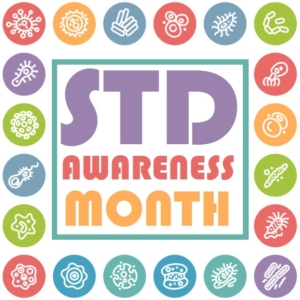It’s April. Spring is in the air! The birds and the bees and the blossoms are doing their thing at a feverish pace, and I wonder if it is intentional or coincidental that April is internationally recognized as Sexually Transmitted Infection Awareness Month…
As we humans, alongside other animals, emerge from our winter dens, it can be tempting to allow ourselves to get swept up in the dance of frenzied excitement that nature is whipping up all around us.
So, what to do if we’ve followed the lead of the birds and the bees and picked up a little something along the way? Can we turn back to nature for remedies to treat sexually transmitted infections?
Read on to get this herbalist’s approach to take on Spring Fever and any microbial friends we may have caught.
What’s a Sexually Transmitted Infection?
Sexually Transmitted Infections, also known as STIs, STDs and historically referred to as venereal disease (VD), are bacterial, viral or fungal infections contracted through sexual activity. These infections can be acquired through vaginal, anal or oral sex, and even through skin to skin contact. Common STIs include chlamydia, genital warts, gonorrhoea, herpes, HIV, and syphilis.
It can be difficult to know for sure if we have an STI, as they can be acute infections (all of a sudden) or chronic (something we’ve had for a long time), asymptomatic (no symptoms) or very uncomfortable, painful or embarrassing. If you have female anatomy, non-infectious* conditions like yeast overgrowth, bacterial vaginosis, or urinary tract infections can cause symptoms that may look or feel similar to STIs, so it’s especially important to get tested regularly, when symptoms arise, or when engaging sexually with a new parter.
(*referring to these as non-infections isn’t entirely accurate, as the imbalanced bacteria or fungal cultures that cause these conditions can be passed back and forth between partners)
STIs are much more common than we think; Up to 75% of Canadian adults will get an HPV infection in their lifetime, for example, and as many as 1 in 7 Canadians will be infected with the virus that causes herpes at some point. According to the World Health Organization, over a million people contract an STI every day.
Despite the widespread prevalence of STIs, many people carry a lot of shame around sexual health. While there’s nothing shameful about sexual activity, it’s important to note that, like everything in life, there are risks to bear in mind. Just like riding a bike can be risky, and we wear helmets and avoid certain terrain to reduce potential harm, we can also take precautions to reduce our risk of contracting an STI.
For more information about common infections and how to get tested, visit your local sexual health clinic or website like Island Sexual Health, Health Canada or the Center For Disease Control .
So, your inner hippy might be wondering: how can I stay as healthy as possible while honouring both my human need to connect and my values, which align more with natural health interventions?
Here’s my take:
1- Get Tested
Modern medicine has some incredible diagnostic tools, including blood and urine sampling. Even if you don’t love engaging with the current medical system, I encourage you to use the tools available to get as much data as possible so that you can decide how to proceed from there. If you’re sexually active with multiple or new partners, it’s especially important to get tested even if you don’t have any symptoms. Remember, some STIs like chlamydia won’t show any symptoms right away, but can lead to longterm health consequences like pelvic inflammatory disease or infertility, and you may unknowingly pass the infection on to someone else.
In British Columbia, websites like Get Checked Online make it really easy to get yourself a lab requisition even if you live in a place where getting access to a primary care provider is hard.
2- Practice Safer Sex
Protect yourself by using condoms and other barrier methods, but also by keeping yourself informed of your partners’ status by initiating honest conversations about sexual activity and choices.
3- Take a holistic approach to health
From a holistic health perspective, there are many things we can do do help boost the body’s inherent immune response against potential pathogens including:
- Getting adequate sleep
- Getting adequate nutrition (prioritizing crucial immune-boosting nutrients like zinc, vitamin D and vitamin C)
- Managing stress
- Staying hydrated
What about herbal remedies?
Herbs are amazing allies and have been used by humans since time immemorial to promote health and treat disease. We have written records of STI treatment protocols from multiple traditional medical systems around the world, and every year new scientific papers are being published that demonstrate how and why traditional remedies work.
It’s important to note, however, that few modern-day studies have focused on proving the efficacy of herbs (or the phytochemical compounds found therein) on specific STIs in vivo (on a living person). But we can look to historical records, and extrapolate that herbs with known antimicrobial, immune-boosting, anti-inflammatory, and wound healing properties may all be supportive when fighting STIs, leaving us with a significant list of potentially supportive herbal allies.
Here are some noteworthy friends:
- Berberine (found in goldenseal, oregon grape, etc.) has been shown to be active against the herpes virus in vitro
- St. John’s Wort extract and the essential oils from chamomile, ginger, thyme, hyssop and sandalwood have shown to be active against herpes simplex virus (HSV) in in vitro studies.
- Echinacea is known to both boost immune function and has shown to have antiviral activity against HSV
- Adding licorice extract to idoxuridine, a pharmaceutical antiviral gel used to treat genital sores, significantly boost its efficacy
- Garlic has a long historical use as STI treatment thanks to its antibacterial and antiviral properties. When consumed raw, garlic can have a systemic antiseptic effect
- Calendula, chamomile and lavender flowers help promote wound healing and reduce inflammation, making the blossoms ideal to use in a wash or bath for genital sores.
So while we don’t have sufficient scientific data to prove that guzzling or bathing in chamomile tea all day long we be enough on its own to clear an infection, incorporating plants into your life – be it through diet, as soul soothing home decor, or as herbal medicines – is undoubtedly a healthy choice and will improve your body’s overall health and resilience.
If you are living with an active or chronic infection and want to take a natural approach to treating it, work with a qualified professional, like a clinical herbalist or naturopathic doctor, who can advise you about the safest and most effective herbs and doses for you.
Want to learn more about working with a herbal therapist for sexual or reproductive health? Book a free intro call with me here.
This article is for educational purposes only and does not constitute medical advice. If you have or think you may have an STI, please consult your care provider.
References:
How Common are STIs in Canada? | Action Canada for Sexual Health and Rights. (n.d.). Www.actioncanadashr.org. https://www.actioncanadashr.org/resources/sexual-health-hub/sexually-transmitted-infections/how-common-are-stis-canada#:~:text=75%25%20of%20adults%20will%20have
Sexually transmitted infections (STIs). (n.d.). Www.who.int. https://www.who.int/news-room/fact-sheets/detail/sexually-transmitted-infections-(stis)#:~:text=More%20than%201%20million%20STIs
Bone, K., & Mills, S. (2013). Principles and Practice of Phytotherapy: Modern Herbal Medicine (2nd ed.). Edinburgh Churchill Livingstone, Elsevier.
Hoffmann, D. (2003). Medical herbalism : the science and practice of herbal medicine. Healing Arts Press.




